Fight the Power: The incredible life story of unsung Welsh hero ‘Red’ Ray Davies
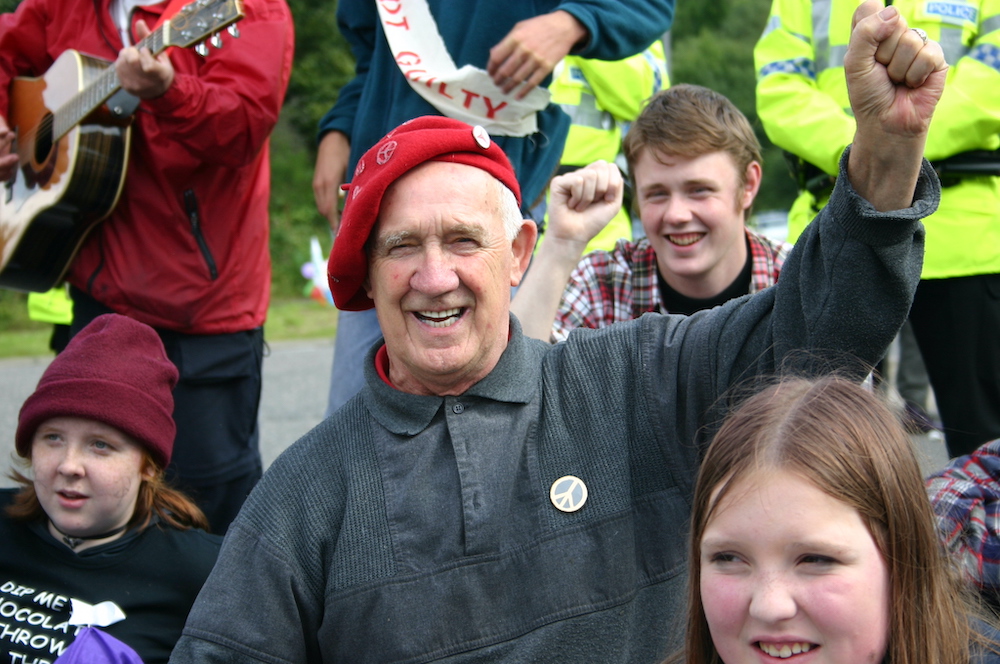
Christopher Evans
Activist, socialist, protester, campaigner, crusader – it doesn’t take a genius to decipher why an unsung Welsh hero was known as ‘Red’ Ray Davies.
A true Welsh revolutionary, Wales’ own Che Guevara devoted his life to fighting injustice and repression, standing up to exploitation and oppression, and protesting for peace.
Despite his staunch pacifism, Ray Davies tirelessly fought the power. A true internationalist and indefatigable defender of human rights and societal equality, his passion never dwindled, and he spent more than half a century campaigning for what he believed in.
Part of the Palestine Solidarity Campaign, he would be as shocked and appalled at the chilling events happening in Palestine as he was when he visited, something that he did on numerous occasions.
Davies’ life reads almost like an unbelievable fictional story. It is one full of hardship, loss, and despair, yet also of hope, empathy, altruism, and determination.
Early Life
Born on 7 January 1930 at the Cardiff Royal Infirmary, Ray Davies grew up in the Welsh mining village of Llanbradach, near Caerphilly, during the depression. His father George was a collier, whilst his mother Winnie was a housewife looking after her eight children.
Tragically, Winnie lost her life giving birth to her ninth child. Along with the deprived and dire social climate in south Wales, it was an event that shaped Ray, in what was a childhood filled with adversity and anguish.
Speaking to Nation.Cymru, his son, the musician Tad Davies, says his father’s childhood is almost inconceivable to believe.
“I know my father had a hard upbringing, but one that was not unique to the area, unfortunately. Death and poverty were bread and butter to a community beaten down by the 20s strikes and depression of the inter-war years.
“He was living in a time when almost a million people left Wales for greener pastures. His father George was frequently absent due to work, having to travel up to the Lancashire coalfield for long stretches as he had been blacklisted from all the local mines due to the 20s strikes.
“My dad faced terrible persecution and abuse in school by draconian teachers for being the son of a blacklisted miner on the dole, and for frequently being caught by authorities stealing coal from the slag heaps with his nan. He would later lead the calls for banning corporal punishment in schools due to his own experiences.”
30-year-old Tad, who is the bass player for Welsh singer Gwenno’s band, adds: “His mother had to break it to him that they could not afford the clothes and books needed to go to grammar school, and with that, he set his sights on the mines to earn a living for his family.”
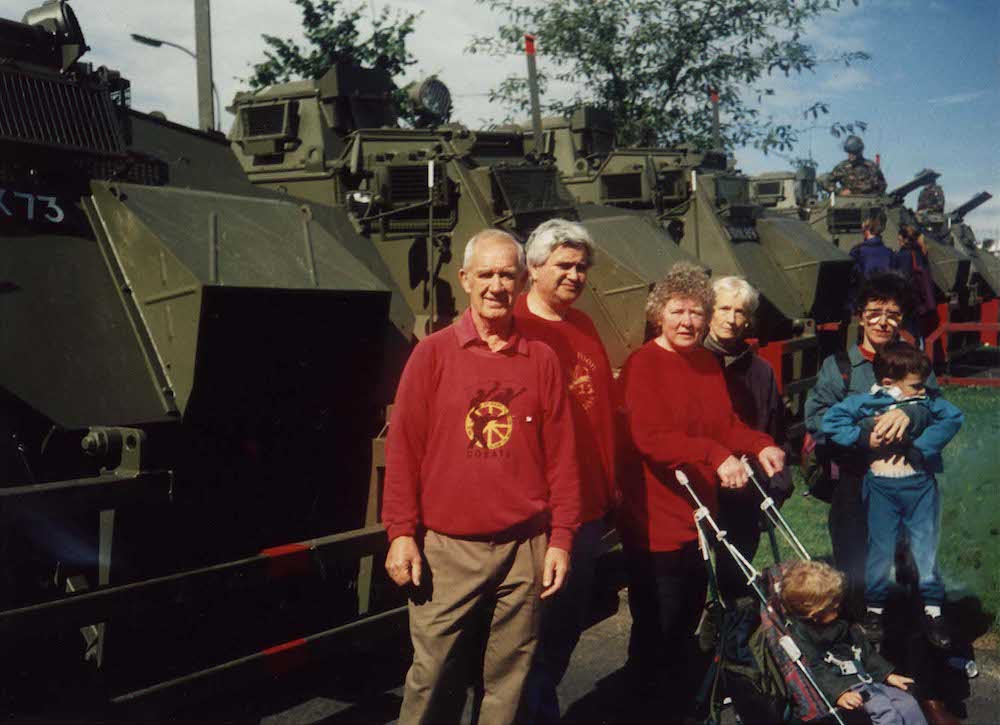
Child Miner
In 1943, the intelligent and resolute young boy decided that if he could not pursue academia, he would follow in his father’s footsteps.
“He started as a boy miner at 13, just shy of his 14th birthday,” says Tad.
“It was not long after his mother had died in childbirth due to not being able to get a hospital bed, which was a truly defining and radicalising experience for my father, living in a pre-NHS world.
“It split the family apart, his father fought to keep the children together, but the authorities gave the baby up for adoption and sent most of the children to orphanages across the country.
“Dad and his older brother, the only ones who worked for a living, fought and saved to bring the family back together again.”
Horror
Tad says that his father told him many stories of his experiences down the mines with “a mix of pride and obvious horror.” It makes for grim and heart-rending reading.
“It’s almost incomprehensible to imagine a 13-year-old being allowed to go underground and do manual labour so close to today.
“As a malnourished skinny 13-year-old of short stature, he was hardly a prize catch, and was passed from one miner to another, much to his shame, as a bit of a hindrance.
“Eventually a kindly older miner named Fred took him under his wing and built up his confidence down the mines, soon becoming a successful duo.
“It was here that Dad experienced one of his many losses when working a late shift. The mining shaft collapsed and crushed Fred in front of his eyes, leaving nothing but his feet poking out of the rubble.”
Loss
Ray’s young life had already been filled with unimaginable loss, and he experienced even more distress during his time down the mine.
“He lost another friend, a gentle miner named Adam, due to homophobic persecution in the mines and the culture of the community in general,” says Tad.
“As much as dad tried to defend him and debate gay rights in meetings, the trade union leaders weren’t interested. Adam was found floating upside down in the quarry pond.”
Tad says that his father’s fierce politicisation and flair for public speaking developed from the camaraderie and collective optimism he experienced with his fellow workers, as well as their shared social and political outlooks.
“Deep underground and away from the bosses, these proud people imagined their futures and debated the topics of the day. He joined the popular Young Communist League with the other kids, disappointing his Labour supporting father, who’s own father helped set up the local Labour Party in Llanbradach.”
“He was a bit of a communist firebrand, and it took many years before his father could persuade him to tone it down and join the respectable ranks of Labourism!
“His first political act would be organising a boy miners’ strike when he saw that the Bevin Boys that were recruited for the war effort received training, hard helmets, and boots, while he wore a soft cap and his uncle’s cast-off shoes.”
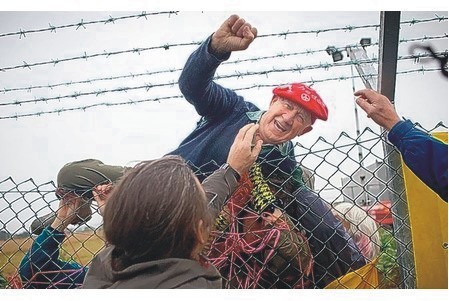
Hope
It was during his time as a collier that Clement Atlee’s Labour won the 1945 General Election. With social and economic suffering during the inter-war years, there was finally hope.
Labour’s election win, which ultimately led to the formation of the NHS by the Welsh Health Minister Aneurin Bevan in 1948, was also the subject of ‘The Spirit of ‘45’, a film by the legendary Ken Loach.
Speaking to the BBC in 2013 about Labour’s election win, Ray Davies said: “The miners all wanted a new world and they felt hopeful that this new generation of politicians could deliver that.
“I was underground with around 40 others when we were waiting for the election result. When we heard it was going to be a landslide all these big, strapping men had tears rolling down their cheeks.
“I asked one of them why he was crying and he said ‘This means we will take control of our own lives for the first time and have a better hospital service so people like your mother won’t die like that anymore.'”
These experiences would unsurprisingly stay with him for the rest of his life, and he would later pen ‘A Miner’s Life’ (2014), a book about his life as a boy miner, as well as his role in the miners’ strikes in the 1980s.
A socialist to the core, the funds raised from sales of the book were donated to former miners who were in ill health due to the perilous work they had undertaken.
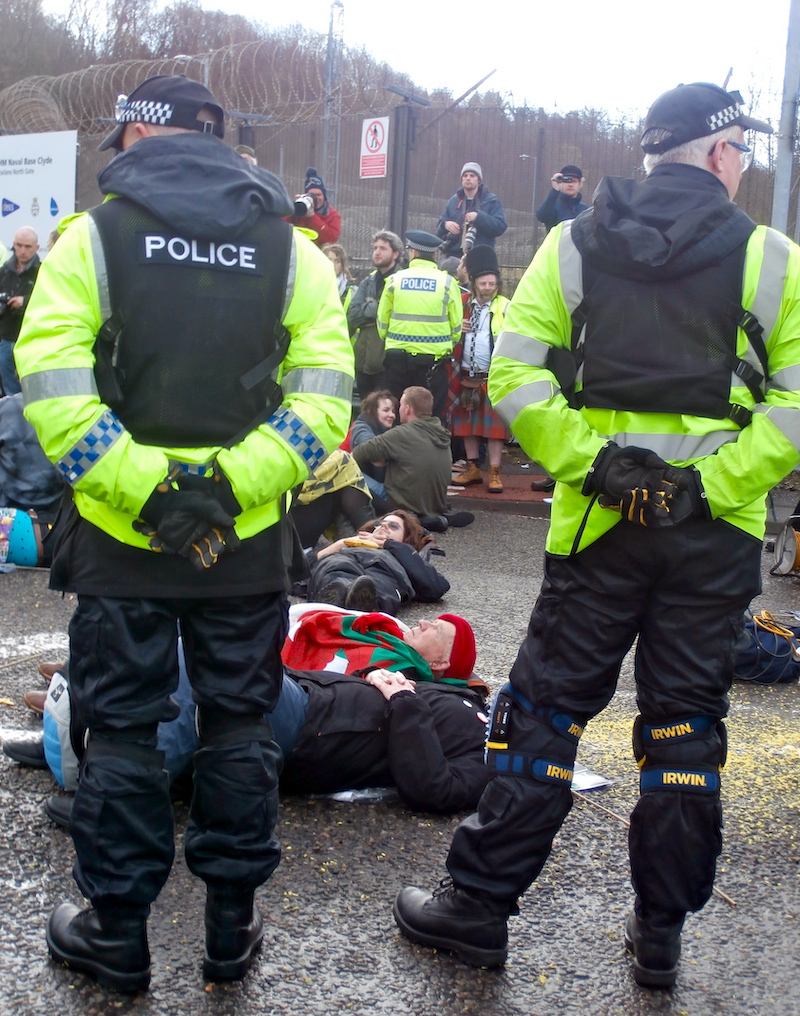
National Service
After leaving the Llanbradach mining pit aged 18, Davies was stationed in the north-eastern Italian city of Trieste as part of his national service. It was a mixed experience for the anti-war Davies.
“I think my dad found the army a very kaleidoscopic experience,” says the erudite Tad Davies, who has the fire in his belly like his father.
“On the one hand, he found the camaraderie there inspiring and made friends with many of the locals when he was stationed in Italy. More than once he swapped uniforms with a local shepherd to fool the bosses.
“On the other hand, as a socialist and a pacifist he refused to shoot his gun, so was relegated to peeling potatoes in the kitchen for most of his duration!”
Tad, a committed socialist like his father, adds: “It was also a formative experience for him as a Welshman. For the first time he left the 7-mile radius of his valley and was around people who would call him “Taffy” relentlessly.
“He was on the tail end of compulsive conscription, and I think we can all agree it should stay in the past.”
Councillor
Following his stay in Italy, Davies returned to Wales and worked as a labourer and then refectory engineer at Llanwern steelworks in Newport.
He was first elected as a Labour councillor for Rhymney Valley Urban District Council in 1964, and represented Bedwas, Trethomas, and Machen on Caerphilly County Borough council from 1995.
Davies became known for wearing his distinct red beret and his role as a councillor didn’t tone down his staunch beliefs. His activism certainly never wavered. In fact, it continued with aplomb.
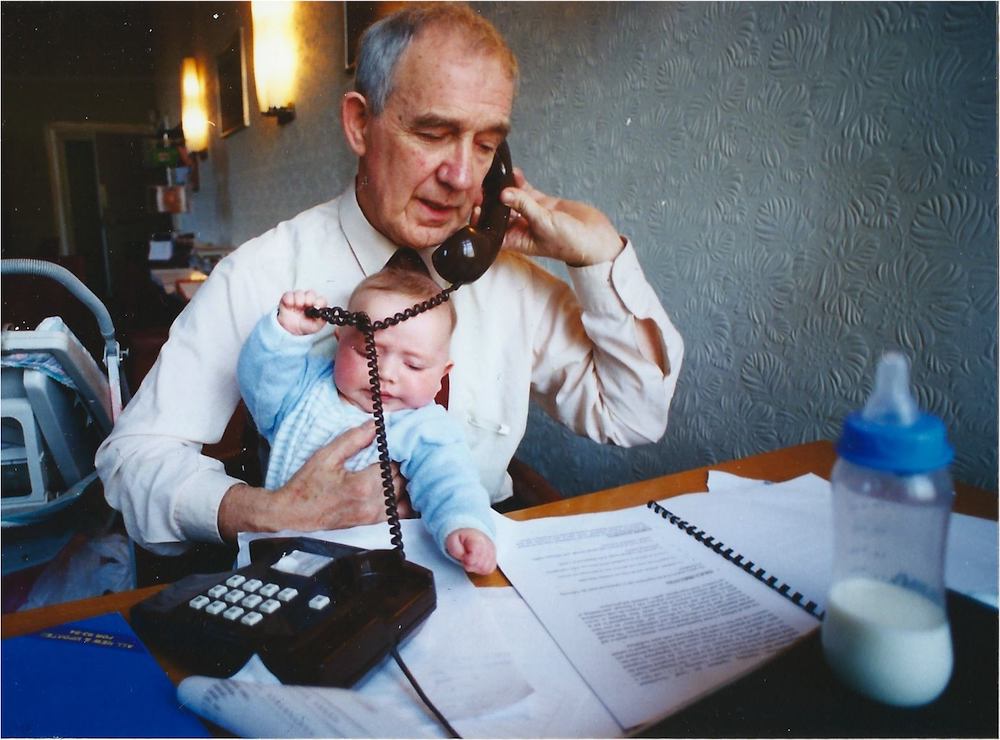
Aberfan disaster
Davies’ altruism led him to being one of the first on the scene following the catastrophic Aberfan disaster in 1966, where 116 children and 28 adults tragically lost their lives.
Tad grimaces when retelling his father’s experience.
“My father was traumatised by Aberfan. He was one of the first to rush to the site after hearing about it and was part of the excavation team of volunteers shifting through rubble and bodies.
“He always maintained that the National Coal Board never heeded the warnings of the local villagers to divert the many streams coming down from the tips. He said that the true heroes were not the police or the fire brigade or the visiting royalty, but the miners and villagers who came from all over the valleys to help excavate and clear the price that coal had paid.
Tad Davies shakes his head, his shock of black curly hair following suit. “He was disgusted with the fallout over where the money should be allocated, and most families would not see a penny for many decades trapped under bureaucratic rubble.”
Activism/Imprisonment
Davies’ activism and desire for change led to several stints behind bars. This included being arrested for lying down in front of lorries crossing picket lines at the Alpha Steel plant in Newport in 1980, on anti-nuclear protests, as well as numerous cuffing’s during the 1984-85 miners’ strike. Immutably principled, he also spent time in prison for refusing to pay the poll tax.
Tad Davies is understandably proud of his father’s actions.
“Around my father’s Welsh socialist circles, being arrested was something of a badge of honour. My mother took me to visit him in prison as a baby and apparently I cried relentlessly until I left the cell – obviously I wasn’t a fan!”
He adds: “I can’t count the times he’s been imprisoned for various causes, whether it’s the miners’ strike, poll tax, or the campaign for nuclear disarmament. (Davies played a huge part in CND Cymru – The Campaign for Nuclear Disarmament in Wales).
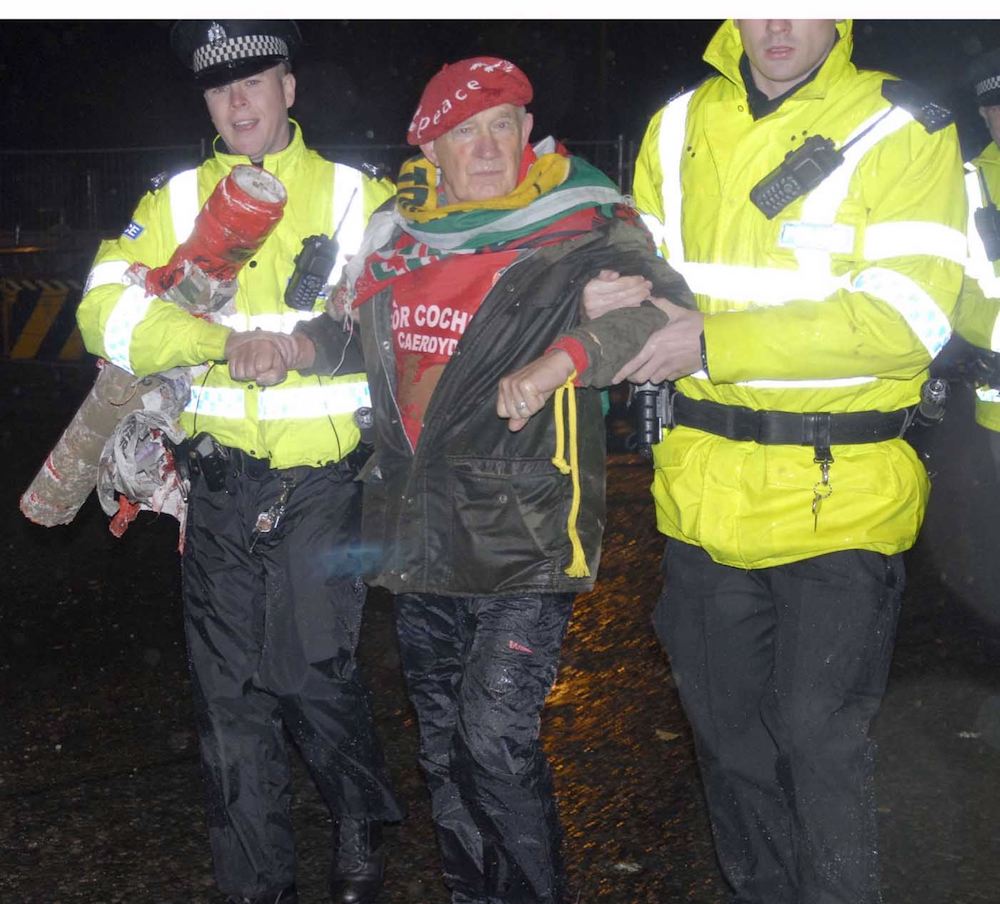
“It has always been a point of pride for me that he would risk it all for something he believes in. He taught me the unwavering truth that every right we have won today was illegal once.”
Tad chuckles when recounting some of the frequent knocks on the door from the authorities. “I can’t tell you how many times as a child he’d tell me to lie to the police if they knocked at the door – ‘dad’s not here, mister!’”
Unsurprisingly politicised and socially aware, Tad Davies says he could never understand that his peers and their families didn’t seem interested in what was going on in the world, both locally and internationally.
“Growing up I was astounded to find that other children didn’t talk about politics at the dinner table, even the idea of politics as a taboo subject seemed appalling to me.
“My dad instilled in me such a clarity of vision of what the world could be if we just willed it into being, paired with a fusion of the local and global, and how they are inseparable.
“Being a local and global peace campaigner, a nationalist and an internationalist – they don’t need to be contradictory things.”
Palestine
The atrocities still happening in Palestine would horrify Ray Davies, who campaigned incessantly for Palestinian rights throughout his life. He had the wounds to show for it, getting shot in the head on one of his many visits.
“My father had a long abiding solidarity with Palestine, first visiting in 1994 after three years of raising money with his choir, Côr Cochion Caerdydd,” says Tad.
“His new wife (my mother) and my 1-year-old-self went along too. I was passed around many refugee camps to cries of ‘habibi!’ – much to my confusion I imagine.
“Visiting Gaza had a deep effect on him, especially after seeing the luxury of Tel Aviv and then settler villages. Starving children, uncollected rubbish, non-existent health provisions.
“He said the sea was beautiful, marred only by Israeli military boat patrols preventing local fishermen or any other activities on the coast.
“On his way out, he smuggled a Palestinian student who was due to finish his final year at Birzeit University. He’d had his travel permit confiscated at an Israeli military checkpoint.
“As you can imagine his Palestinian driver was beside himself with fear, but they made it through and got the kid to his university.”
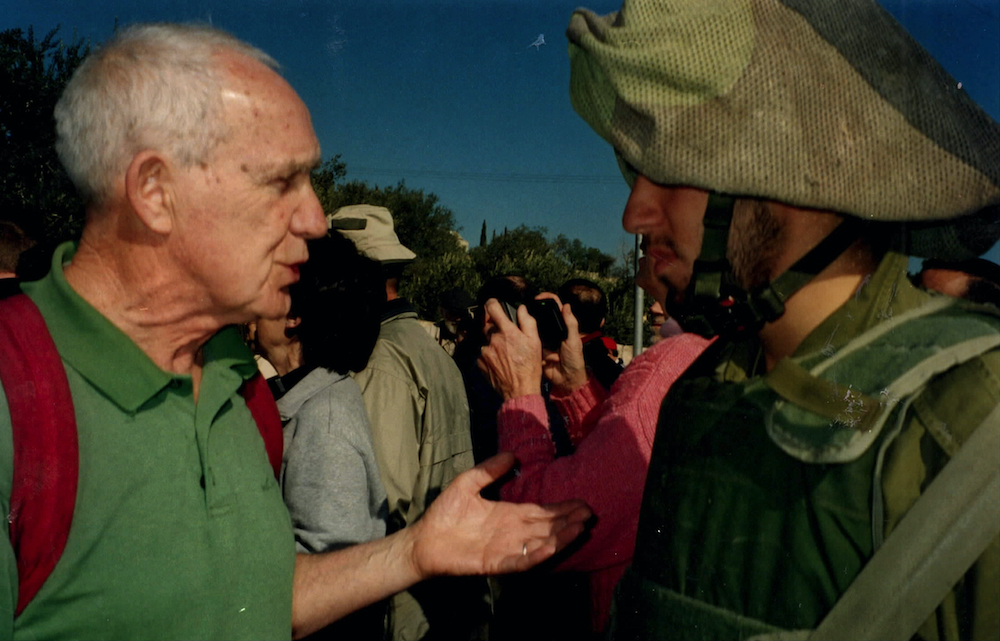
Palestine Solidarity Cymru
Tad says his father was aghast but inspired by what he witnessed on his first visit.
“From his first experience he’d help set up Palestine Solidarity Cymru with the choir, which is still going strong today in these trying times.
“It would not be the last time he’d visit. He snuck into Israel three more times, being detained by authorities, claiming he’d lost his passport, or that he was on a honeymoon with his wife. Sometimes he’d come through, sometimes they’d send him back to Britain, but he was relentless.”
“He last visited Palestine when he was 80. Other stories involve him chaining himself to an olive tree to stop the Israeli army bulldozing them, joining Israeli peacemakers in pulling down the separation fence, and of course, infamously being shot in the head whilst escorting ambulances carrying wounded Palestinians to hospital. Needless to say, my 9-year-old self was confused and distressed at the news!”
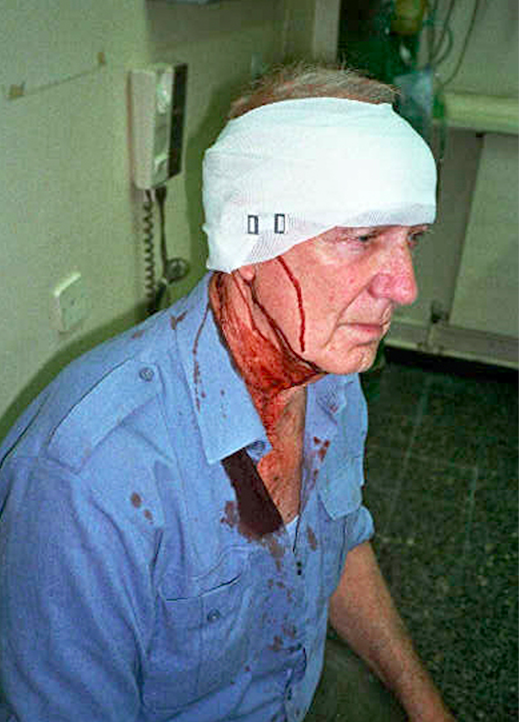
In 2003, Davies narrowly avoided death after a bullet grazed past his head when he was caught in crossfire between the Israeli army and Palestinians at the Balata refugee camp. After a blood transfusion and stitches, he was soon helping again on his release from hospital.
Aged 79, he was also knocked unconscious by police during a march in London protesting against the bombing of Gaza.
A Palestinian in Wales
Tad also recalls how his dad’s incredible empathy led to the family taking in a young Palestinian boy who needed medical support.
“I was also kicked out of my bedroom for a deaf Palestinian boy named Ahmad who came to live with us for a while. My father was staying in his family’s house in the Balata refugee camp, and the deaf boy would not leave his side.
“Unable to play with the other children as he could not hear gunshots, he was forced to spend his days in isolation in his house. Raising £3000 my dad brought him to Caerphilly to be installed with hearing aids.
“I did not appreciate this gesture at the time, but considering the current events I can’t help but think of where Ahmad is now, and hope he remembers his time in Caerphilly.”
Asked about what his father’s thoughts would be on the continuing persecution and bombing of innocent Palestinians, Tad exhales and sighs.
“The current situation is despicable, and I’m sure my dad would be horrified at the merciless retaliation and ethnic genocide that continues to be acted out in the name of Israel.
“One million displaced people. Displaced from what was already a refugee camp surrounded on all sides by Israeli enforcement, cut off from electricity, running water and food, bombed and killed in their guaranteed safe exit points.
“The disparity between what world leaders and politicians tout in the media and what people believe on the ground is both baffling and inspirational.
“The spontaneous marches and solidarity throughout the world for the plight of Palestinians gives me faith and lets me know that my dad still lives – as long as there are people that are willing to fight for peace and justice, and an end to the persecution of Palestinians from their land.”
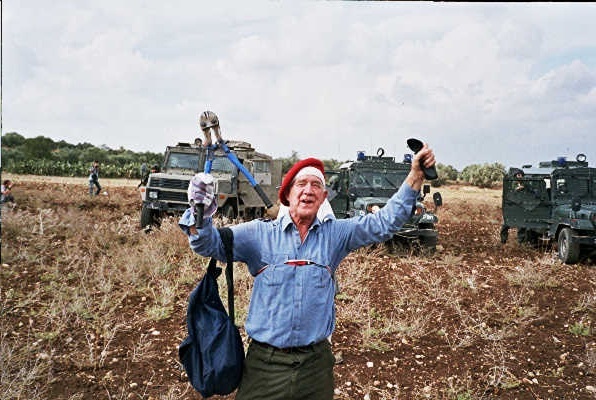
Empathy and Tragedy
Ray Davies was a family man full of love and empathy. His beliefs have been passed down to his son, who says it never ceases to amaze him what an understanding and compassionate person his father was.
“My dad instilled in me a deep empathy for people, no matter their background or what they went through. We tragically lost our older brother Mark, a few months before my father died himself. Dad found him in his council flat resting peacefully on his bed just after New Year’s 2015.
He adds: “Mark was a beautiful soul, with nothing but love to give to me and my brother. But as an addict struggling with manic mental health problems, he found himself frequently rendered homeless, unable to hold a career and was dependent on my dad.
“Mark was ostracised from society as an addict, a freak, and a homosexual, and my father had such a deep empathy and understanding for his situation that it still leaves me speechless to this day.
“He could find the good in anyone and truly lived by the mantra ‘Before you judge a man, walk a mile in his shoes.’
“It left me with a deep empathy for addicts, the homeless, and people struggling with mental health, and an anger at those who judge too quickly on a person who might have lived a very different life to you.”
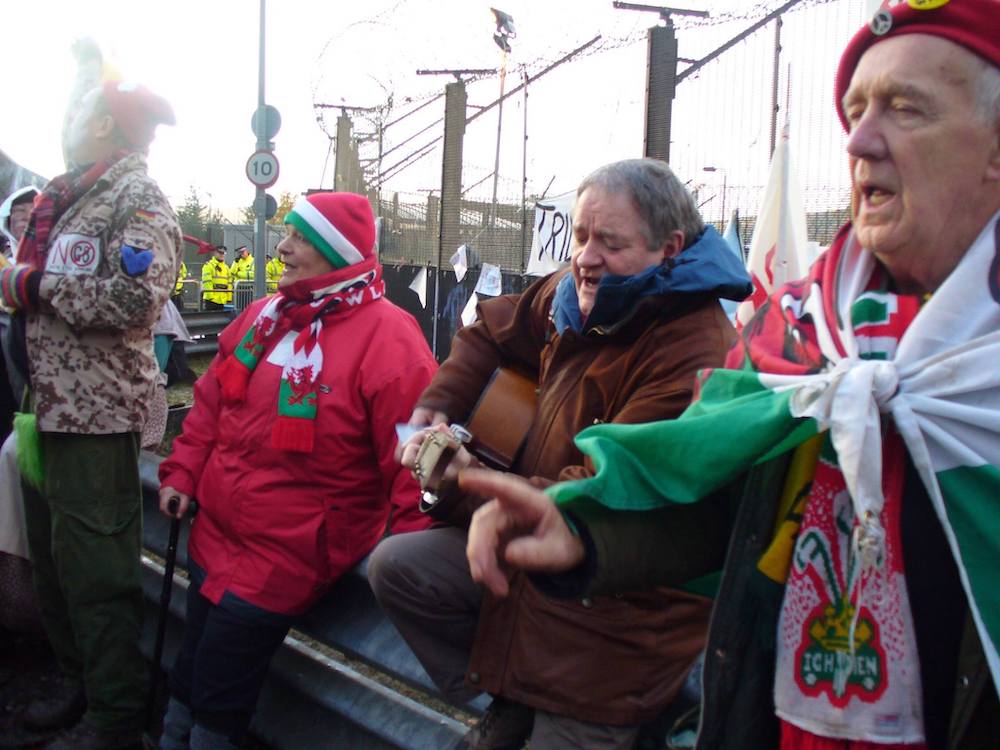
Family man
It is heart-warming to hear Tad talk so fondly and lovingly about his father, who had many other interests aside from his campaigning and activism.
“He had a litany of hobbies that kept him busy when he wasn’t being shot or arrested! After he died we had three different male voice choirs asking for their suits back!”
Despite being a person for the people, Ray liked solitude and time with his family.
“He was incredibly private behind closed doors, never having friends over or throwing parties. He famously hated parties, especially his own!
“I think he was such a raging socialist and ferocious campaigner in the outside world he needed the calm sanctuary of home to clear his mind – not that me and my quarrelling brother would have helped with that!”, he laughs.
“He’d spend his time gardening, birdwatching, and reading the trashiest old pirate and romance novels you can imagine.”
Tad continues, clearly enjoying reminiscing about his father: “He kept incredibly fit as well, and I’ll always remember the last time I saw him. He was 85 years old and he’d cycled from Bedwas to Cardiff to meet me for a coffee when I was in university.
“He had been suffering with cancer for half a year and hadn’t told a soul apart from my mother. He continued working and campaigning tirelessly until he physically couldn’t stand anymore, and only then, quietly and peacefully fading into the legend he is today.”
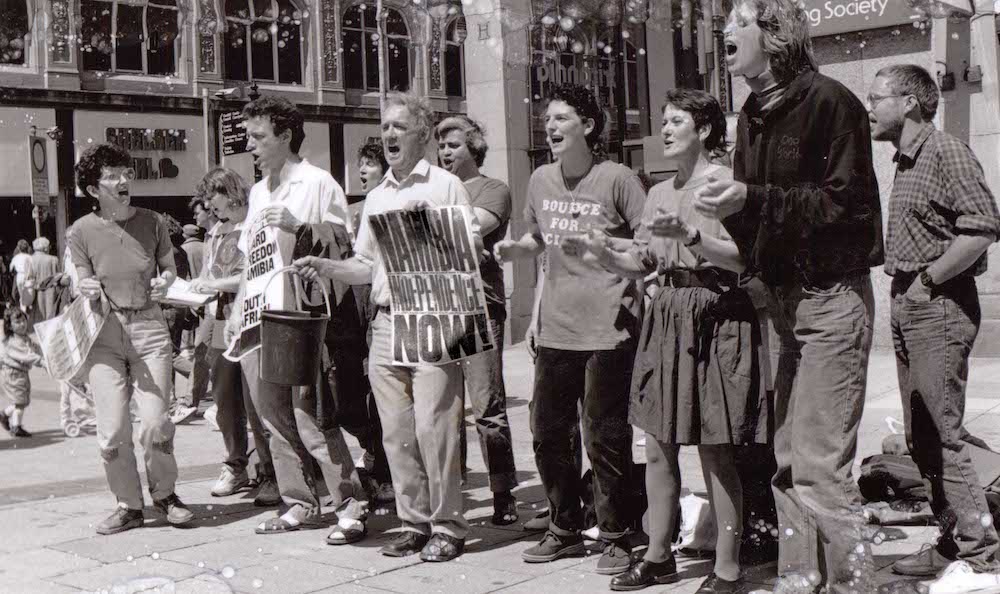
Memories
There are so many tales and stories to tell about his father, but Tad says it’s the simple things that bring the best memories.
“Although the two of us would go cycling and frequently took hiking trips throughout his 70s and 80s to peaks such as Ben Nevis, some of my strongest memories are barely tangible, but incredibly mundane and beautiful every day acts and interactions.
“The hug after coming home from university, his strong grip holding me, and the bristly feel of his old man jumper with a thousand holes in it.
“The smell of a ridiculously unhealthy bacon butty that he’d insist on making for me against my mam’s wishes. The comfortable silence in a coffee shop catching up, his deep-set laugh lines betraying a lifetime of love and laughter, from Palestine to Bedwas.
“On one of our last interactions he showed me where his parents were buried, and I think deep down I knew what was coming but was too distracted by university and my own adolescence to ponder on it.”
Later Life and death
After a fascinating life, Ray Davies sadly died of pancreatic cancer on 7 May 2015, aged 85.
“My dad rather prophetically died on Election Day 2015,” says Tad.
“Whether he was spiritually holding back the floodgates that entire time I’m not to say, but between Brexit, Trump, and another decade of austerity and economic ruin, it’s safe to say he’d have a few choice words!
“But through it all he never gave up his faith in working people, and he’d be heartened by the mass movements like Black Lives Matter, the RTM union strikes, and the millions of people over the world protesting for peace in Palestine.
“He often quoted ‘wherever people struggle that is my native land.’”
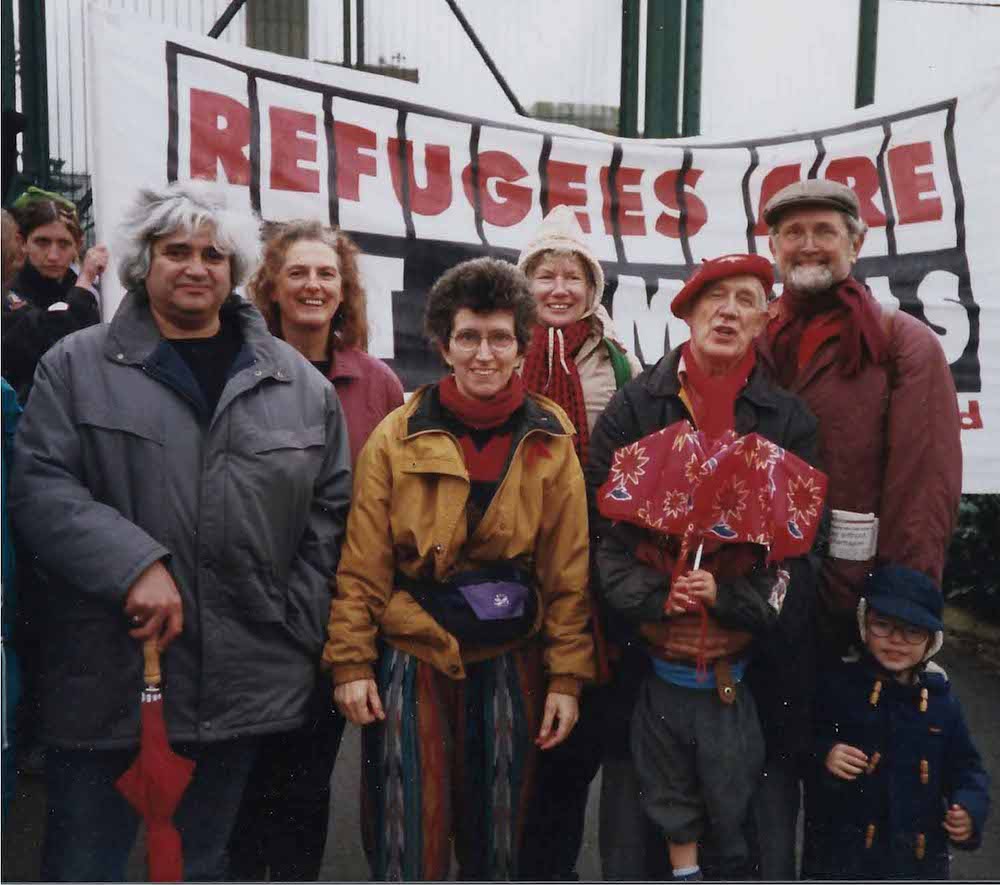
Memorial
On 15 May 2015, a memorial was held in honour of Ray Davies. Over 500 people who loved and had been inspired by Red Ray packed out Bedwas Workmen’s Hall. It was a fitting tribute to a local hero.
Carrying the torch
Despite his dad no longer being there, Tad Davies is certainly carrying the torch and following in his father’s footsteps. He regularly campaigns and volunteers for good causes – the apple doesn’t fall far from the tree. Red Ray would be proud.
“I’d like to think I keep my dad’s flame burning in a small way. His emphasis on the local as well as the global has influenced me immensely, as well as the power that working people have to change their communities.
“In a post-Thatcher Britain, the ideas of individualism, entrepreneurialism, and the general idea that people are inherently bad have seeped into the cultural consciousness, therefore every interaction is a battleground to counteract that.
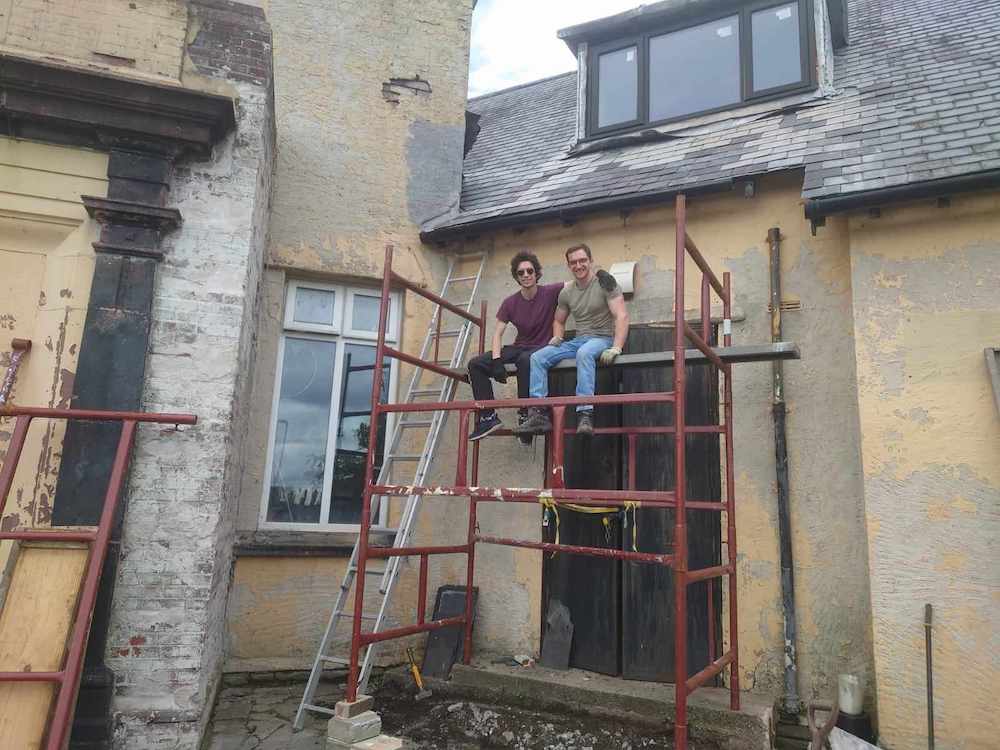
“Just through small actions like free food events in underfunded estates across the valleys, litter picking at old abandoned heritage sites, and volunteering in restoring old community assets, you can find an immensely rewarding and politicising experience that counteracts the general cynicism steeped in this world.”
He adds: “Working with Colin Thomas on numerous events showing old Welsh history documentaries like ‘The Dragon Has Two Tongues’ and ‘Facing the Fascists’ has also been incredibly rewarding and inspiring. Especially when screened in local venues like Bedwas Workmen’s Hall, which were built by the workers, for working people’s leisure, entertainment, and education.
“I currently volunteer occasionally with the restoration of Cefn Fforest Miner’s Institute which is in its fourth year of restoring the building, carried on the back of normal working people volunteering every week, mirroring the origins of the building itself.
“I’ve also had the pleasure of helping to restore Abertillery Workmen’s Hall as well. These institutes are a powerful reminder of worker’s collective power, using their own wages to build a hub for their community.
“With a billiards room, a bar, a socialist miner’s library, these places were an incredible synthesis of politics, leisure, and community power, and with the previous decades seeing many flattened for car parks or luxury flats – Llanbradach Miners Institute was flattened by the council in the 2000s for a carpark! It’s vital we don’t let this fragile history disappear into the ages.”
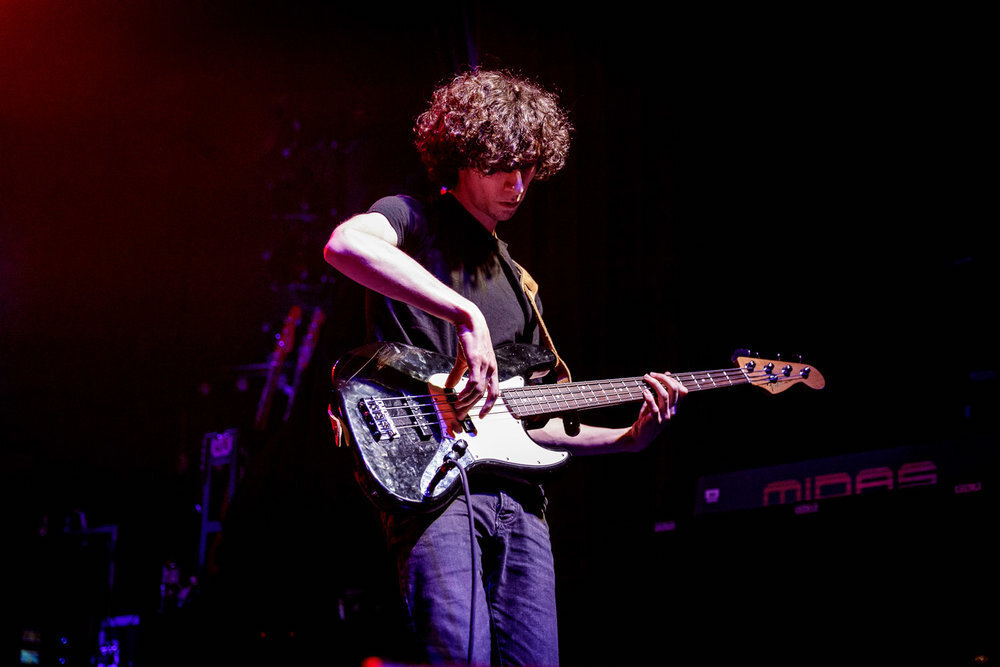
Fittingly, an appeal was also set up in Ray’s honour following his funeral.
“Red Ray’s Lift appeal began when his relatives couldn’t climb the steep stairs at the workmen’s hall for his funeral. It reached its target for a disabled lift in 2023 thanks to the hard work and years of fundraising by volunteers in Bedwas Workmen’s Hall. It will be a lasting legacy that would make dad proud.”
Conclusion
It is impossible to fit everything into a piece about Ray Davies’ life. He seems to have been present at so many significant and historical events. There is a book in waiting for his incredible story.
Ray’s life story is a reminder that we must never give up no matter how downtrodden we feel. History repeats, as we are constantly reminded, but history can also be made.
Red Ray truly believed he could help change the world, and he certainly did. He left a legacy, one that his son is helping to continue.
A family man, friend, and comrade. We need to celebrate our brilliant people more than we do. Red Ray Davies was certainly one of them.
Support our Nation today
For the price of a cup of coffee a month you can help us create an independent, not-for-profit, national news service for the people of Wales, by the people of Wales.






Hanes anhygoel. Diolch am ei rannu â ni.